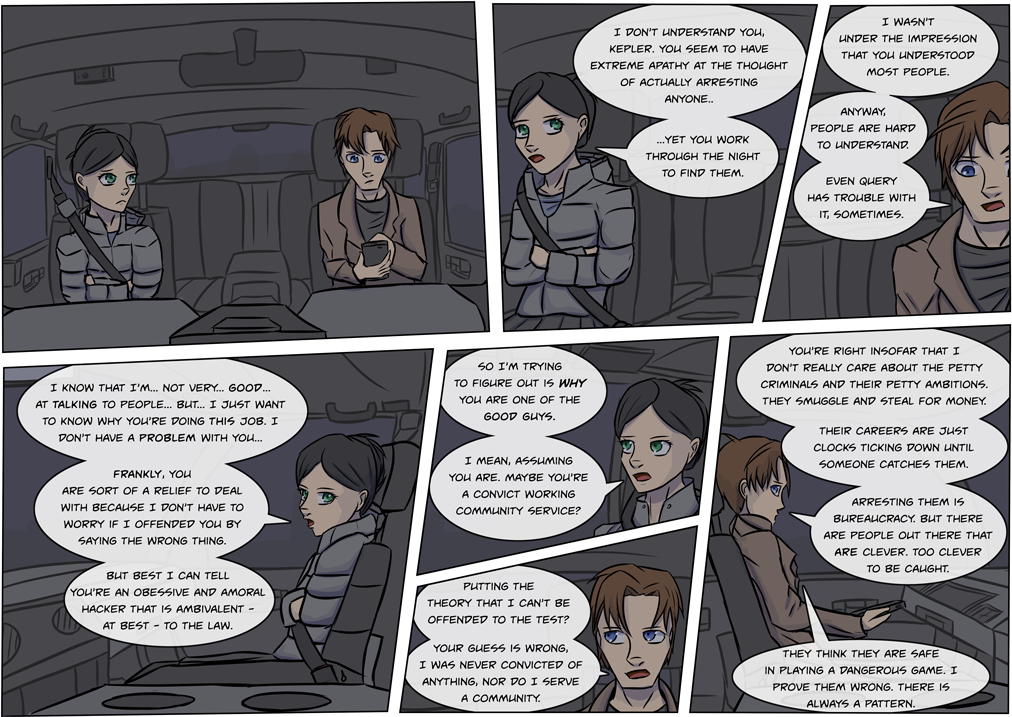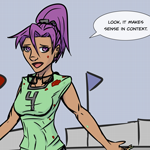Intermission 3, Minus Years 2, Page 4
I think today we see a bit of what we will know as Kally in the future as the Kally in the of the past. She is necessarily overcoming being shy and awkward, but she is grumpy and has already lost any illusion that a conversation with Peter will follow any sort of norms. Peter, well, less so, because the change in Peter is more drastic and tied to events we haven’t seen much yet, but we still get a classic Peter answers a question with a lot of words and only faint brushes of substance. But that has been part of Peter since the beginning of time. In fact, with him, it could be said there is inverse ratio between words and useful information. Probably where Mium got that habit.
But we do see a bit of Peter’s more… obsessive side, I guess, in Minus Years. It doesn’t show up as much in the main comic has he taken most instances of sincerity out back and shot them, so you only see it when he’s under stress.
So we will probably just go ahead and finish Minus Years next week (it has 6 pages). This gives me some time get the buffer back up, and sort through stuff (am flying home tomorrow). Maybe we will start with actual updates on Monday, but may as well see this through at this point.
I think I will continue this segment of minus years for another 4-6 pages, but those aren’t written yet so they will go to on Patreon till the next time we have an intermission. Once I do that, we can have a new goal, or vote on the next bonus comic series or something. I am thinking of buying a new drawing table. Economically, this is unreasonable, but I think it would have a positive effect on quality of drawing time, so it might be worth it. I worry that it will be a slippery slope though, cause then maybe I’d want to get a new desk as I’m not sure it will fit on my current one.
I have some updates to the cast and setting pages I think will go live next week, will link to them when they are updated. Need to go over them to make sure there no spoilers or thing I will regret saying 🙂





So, basically, Peter did his job for the fun/challenge?
That is an option. He could do it out of spite, pride, justice, or vengeance or some other Peter compatible emotion. Just not out of sheer love for the common person law. But I think that was already a pretty safe guess.
So it seems like Peter is somewhat admitting his goals here. Interesting is the fact that he believes that the unjust get punished as a matter of course, he even goes so far as to call it “bureaucracy” rather than treating it as an actual function of the system. I’m certain he believes that if the “system” did not catch those people than others, likely other lawbreakers or possibly even the law of cause-and-effect, would do the job instead. The people Peter is concerned about are the criminals who believe themselves too “clever” to be caught. He specifically calls them “too clever to be caught”, but then in his very next sentence he points out that they “think” they are safe and then his stated goal of “proving them wrong”.
So then, they may be too clever to be “caught” but are they really safe? Is Peter’s goal to catch these people or simply to prove that they are wrong in believing themselves safe?
I believe that Peter is not interested in the chase but rather is interested in simply proving his worldview, that cause-and-effect with respect to evil acts cannot be avoided. Nobody is clever enough to not make a mistake, to leave no trail, and to not eventually get caught up in the pattern of their own wrongdoing. Peter simply wishes to prove this fact at the highest possible levels. He obviously isn’t concerned about how others see him, so he is not trying to prove those people wrong to the world at large.
My question then is if he is trying to prove them wrong to himself (showing a polarization of character that comes from having his views chalanged without a sutable replacement) or if he is trying to prove the “clever” people wrong to themselves (showing a desire to rid the world of this foolishness from the very top down). Either could be true. He has grown up in a privilaged position where the “rules” don’t apply to him (Father seems to MAKE the laws, grandfather decides WHEN or IF those laws apply, and both are influential enough to ignore the rules if they wanted), so it is very possible that his worldview has been challenged by the divide between “evil” and “unlawful” where “unlawful” is clearly permissible in his case but Peter believes “evil” is not (even if Peter’s definiton of “evil” may be nothing more than a karma like cause-and-effect). On the other hand his father and grandfather both, while recognizing their power to throw out the rules, still pay the rules service and his grandfather (Aaron Kepler) even goes so far as to defend following the rules by pointing out the chaos that comes from throwing them out, and this he said when the rules were acting against him. Peter may well agree with his grandfather’s sentiment, if not the application, and see his approach as the more efficient path toward a peaceful and well-run society. Fix the problem at its source, the top, and the results will trickle down.
For a programmer and an engineer I can see his viewpoint that the written “laws” might not always apply, but the fundamental “rules” always do.
Just a note, Arron is his uncle, not his grandfather. Arron is Kyle’s older brother. I do not think we have seen Peter’s grandfather yet.
I think it is a great point that we need to know more about Peter’s upbringing. It has been strongly implied that Civil Service training is probably not normal, and is also not something people are supposed to “turn down”. In the first Minus Years we learn that Peter was not kicked out, he quit (an event that seems to repeat itself when he “quits” the IDS).
But we see telltale marks that Peter’s upbringing was privileged. He is disdainful of the thought of money or actually working for it, he views normal school as a giant waste of time, and he has a firm notion that rules do not apply to him.
I think that is one of the interesting questions – does Peter’s worldview you note here include Peter? Does he have rules he will not break?
My mistake on the family relations.
That rule question is a big one. Does he have concrete “rules” at all or are they more along the lines of “gravity is a rule, one that you can break, but if you try to break it forever you will eventually fall to your death, so better to work with it than try to forever get around it”? I have no idea.
I suspect Peter might be rather more offended at being called “one of the good guys” than at being called a convict.
He’s a nice, comfy *true neutral*, thank you very much, pursuing his own goals, not some stupid “community” ones.
(Or so he might argue, at least. Personally, I’m not convinced either way yet.)
I think it’s important to note that from all we’ve seen, Peter is probably not self-reflective enough to be objective, and even if he was, he certainly not honest enough to say it on purpose. Though I guess this version of Peter might be blunt enough that he literally doesn’t care what someone thinks.
So for Peter it’s all about the “Thrill of the chase”? He doesn’t care about the law, per se, just about proving himself smarter than the super-criminals.
I actually like that. 🙂
A bit Sherlockian, eh?
I am not so sure. I think that is definitely an element of Peter’s personality, but I also do not think that Peter sees it as “proving” anything. Peter already thinks he is better, and has shown very little sign of valuing external validation.
“Yet you working through the night” should probably be either “Yet you work through the night” or “Yet [you’re/you are] working through the night”
Fixed, thanks! 🙂